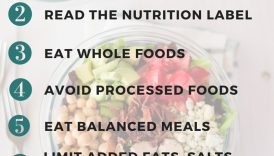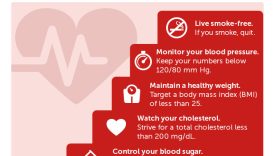7 Simple Swaps for a Healthier EatingWell Life

In today’s fast-paced world, the significance of healthy eating cannot be overstated. With the abundance of fast food and processed options at our fingertips, it’s easy to overlook the profound impact that food choices have on our overall health and well-being. Making conscious dietary swaps is an effective strategy to cultivate a healthier lifestyle, enhance energy levels, and maintain weight management.
- 7 Simple Swaps for a Healthier EatingWell Life
- The Importance of Healthy Eating Swaps
- Benefits of Healthy Eating Swaps
- Improved Energy Levels
- Weight Management
- Swap Refined Grains for Whole Grains
- The Power of Whole Grains
- Easy Swaps to Try
- Choose Lean Proteins Over Processed Meats
- The Benefits of Lean Proteins
- Great Lean Protein Options
- Incorporate More Fruits and Vegetables into Your Diet
- Seasonal Produce Options
- Seasonal Produce Examples
- Opt for Healthy Fats Instead of Saturated Fats
- The Benefits of Healthy Fats
- Healthy Fat Options to Consider
- Reduce Added Sugars with Natural Sweeteners
- The Case for Natural Sweeteners
- Popular Natural Sweetener Options
- Hydration Habits for a Healthier Lifestyle
- The Importance of Hydration
- Simple Hydration Tips**
The Importance of Healthy Eating Swaps
Consider this: when you swap a sugary soda for sparkling water, you might notice a boost in your energy and a reduction in cravings. These small changes can lead to significant health benefits over time. Here are a few benefits that come with implementing healthy eating swaps:
- Improved Energy Levels: Opting for nutrient-dense foods like whole grains can prevent energy crashes.
- Weight Management: Choosing lean proteins and fiber-rich vegetables keeps you fuller for longer, aiding in weight control.
By focusing on healthier options, you not only nurture your body but also create a sustainable path to wellness that fits seamlessly into your lifestyle. Let’s explore some practical swaps that can easily be integrated into your daily routine.
Benefits of Healthy Eating Swaps
Making healthy eating swaps can significantly enhance your overall health and well-being. Understanding the benefits of these swaps is essential for anyone looking to improve their diet.
Improved Energy Levels
One of the most immediate benefits of incorporating healthy food swaps is the increase in energy levels. For instance, switching from sugary cereals to oatmeal provides sustained energy throughout the morning. Oatmeal is rich in complex carbohydrates and fiber, helping to avoid those dreaded mid-morning slumps.
- Quick Energy Boosts:
- Oatmeal vs. Sugary Cereals: Fewer sugar spikes and crashes.
- Lean Proteins: Chicken or fish keep you fueled longer than fried options.
Weight Management
Another significant advantage of healthy eating swaps is effective weight management. By replacing high-calorie, processed snacks with nutritious alternatives, one can control calorie intake without feeling deprived. For example, substituting potato chips with air-popped popcorn helps in enjoying a crunchy snack without the guilt.
- Healthy Snack Choices:
- Air-Popped Popcorn: Low in calories, high in fiber.
- Fruits and Nuts: Providing essential nutrients while curbing hunger.
Adopting these simple, healthy swaps can set the stage for a balanced lifestyle, keeping energy levels up and weight in check.
Swap Refined Grains for Whole Grains
Continuing with our focus on healthy eating swaps, one of the easiest yet most impactful changes you can make is to replace refined grains with whole grains. This simple swap can revolutionize your diet and significantly enhance your nutritional intake.
The Power of Whole Grains
Whole grains are packed with nutrients, including fiber, vitamins, and minerals, which are often stripped away during the refining process. When Jennifer, a busy mom of two, decided to switch her family’s bread from white to whole grain, she noticed an immediate difference in her kids’ energy levels and overall mood.
- Benefits of Whole Grains:
- Increased Fiber: Helps in digestion and keeps you fuller for longer.
- Balanced Blood Sugar Levels: Whole grains can prevent spikes and crashes that often accompany refined grain consumption.
Easy Swaps to Try
Here are a few straightforward swaps to help you transition into whole grains:
- White Rice → Brown Rice or Quinoa: Both are richer in fiber and nutrients.
- Regular Pasta → Whole Wheat Pasta: A great way to still enjoy your favorite meals while enhancing their nutritional value.
- White Bread → Whole Grain Bread: A simple change that offers more fiber and sustenance.
By integrating whole grains into your diet, you will likely feel more energized and satisfied, paving the way for continued healthy eating choices.
Choose Lean Proteins Over Processed Meats
As we continue our journey towards healthier eating habits, one of the most significant changes you can make is to choose lean proteins over processed meats. This swap can deeply impact your health and well-being.
The Benefits of Lean Proteins
Lean proteins are not only lower in saturated fat but are also packed with essential nutrients that our bodies need. Think about it: when Kyle decided to replace his daily lunch of salami sandwiches with grilled chicken salads, he not only felt lighter but also noticed an increase in his energy levels throughout the day.
- Advantages of Lean Proteins:
- Heart Health: Reduced intake of saturated fats lowers the risk of heart disease.
- Muscle Maintenance: Proteins help repair and build muscle, especially important if you’re active.
Great Lean Protein Options
Here are some excellent choices you can incorporate into your meals:
- Chicken or Turkey Breast: Nutrient-rich and versatile for many dishes.
- Fish: Salmon or cod provide healthy omega-3 fatty acids.
- Plant-Based Options: Lentils, chickpeas, and quinoa are superb protein sources for vegetarians and vegans.
By opting for lean proteins, you are not just making a healthier choice; you’re also supporting your body in achieving and maintaining its healthiest state.
Incorporate More Fruits and Vegetables into Your Diet
Building on our theme of healthy eating swaps, increasing your intake of fruits and vegetables is perhaps one of the most essential adjustments you can make. These nutrient-dense foods are key to enhancing your overall health and vitality.
Seasonal Produce Options
Seasonal fruits and vegetables not only taste better but also tend to be more affordable and environmentally friendly. For instance, when Laura visited her local farmer’s market in the spring, she discovered an abundance of fresh strawberries and asparagus. This inspired her to create colorful salads and smoothies, making healthy eating both enjoyable and creative.
- Advantages of Eating Seasonally:
- Enhanced Flavor: Produce picked at its peak ripeness tastes significantly better.
- Nutrient Density: Seasonal items are often more nutrient-rich, providing your body with essential vitamins and minerals.
Seasonal Produce Examples
Here’s a quick guide to some seasonal fruits and vegetables:
- Spring: Asparagus, strawberries, peas
- Summer: Tomatoes, zucchini, blueberries
- Fall: Pumpkins, apples, kale
- Winter: Citrus fruits, root vegetables, Brussels sprouts
By incorporating more seasonal fruits and vegetables into your diet, you’ll not only enjoy a wealth of flavors but also harness the many health benefits they offer. This simple adjustment can transform your meals into vibrant, nutrient-packed experiences!
Opt for Healthy Fats Instead of Saturated Fats
As we dive deeper into our journey of healthy eating swaps, it’s crucial to address the types of fats in our diets. Making a conscious choice to opt for healthy fats instead of saturated fats can significantly benefit your heart and overall health.
The Benefits of Healthy Fats
Healthy fats, such as those found in avocados and nuts, can help to unravel the misconception that all fats are unhealthy. For example, when Mark decided to swap out butter for olive oil while cooking, he not only enjoyed a richer flavor but also felt more energized and satisfied after meals.
- Advantages of Healthy Fats:
- Support Heart Health: Unsaturated fats can lower bad cholesterol levels.
- Boost Nutrient Absorption: Healthy fats aid in absorbing fat-soluble vitamins (A, D, E, and K).
Healthy Fat Options to Consider
Here are some fantastic sources of healthy fats you can incorporate into your diet:
- Avocados: Perfect for salads or spreads.
- Nuts and Seeds: A great snack option or topping for yogurt.
- Olive Oil: Ideal for sautéing or drizzling over dishes.
By making the shift to healthy fats, you can enjoy your meals more while nourishing your body. This simple adjustment can lead to outstanding long-term health benefits without sacrificing taste!
Reduce Added Sugars with Natural Sweeteners
Continuing our discussion on healthy eating swaps, reducing added sugars in your diet can have a profound impact on your overall health. While sugar can enhance the taste of foods, excessive intake can lead to various health issues, including obesity and diabetes.
The Case for Natural Sweeteners
When Sarah decided to cut back on her sugary coffee drinks, she started experimenting with natural sweeteners like honey and maple syrup. To her surprise, she found that a little bit went a long way, and her coffee was just as satisfying without the added chemicals of artificial sweeteners.
- Benefits of Using Natural Sweeteners:
- Better Nutritional Profile: Many natural sweeteners contain vitamins and minerals.
- Lower Glycemic Index: Some natural options can lead to a more gradual rise in blood sugar levels.
Popular Natural Sweetener Options
Here are some natural sweeteners you might consider integrating into your diet:
- Honey: Great in tea or drizzled over yogurt.
- Pure Maple Syrup: Excellent for pancakes or baking.
- Stevia: A zero-calorie option derived from the stevia plant.
By reducing added sugars and opting for natural sweeteners, you can satisfy your sweet tooth healthily while also benefiting from the nutrients they provide. It’s a simple swap that can lead to a world of flavor without compromising your health!
Hydration Habits for a Healthier Lifestyle
As we wrap up our exploration of healthy eating swaps, it’s essential to highlight the often-overlooked aspect of hydration. Staying properly hydrated is key to maintaining overall health and can significantly enhance the benefits of your diet.
The Importance of Hydration
Emily discovered just how crucial hydration could be when she made a habit of drinking water consistently throughout the day. Not only did she feel more energetic, but her skin also started to glow, and she found herself snacking less. Water helps in digestion, nutrient absorption, and even in regulating body temperature!
- Benefits of Staying Hydrated:
- Boosts Energy Levels: Dehydration can make you feel fatigued and sluggish.
- Enhances Focus: Proper hydration can improve cognitive function.
Simple Hydration Tips**
Here are some convenient ways to improve your hydration habits:
- Set a Water Reminder: Use your phone to remind you to drink water regularly.
- Flavor Your Water: Add slices of fruits like lemon or cucumber for a refreshing taste.
- Carry a Reusable Water Bottle: Having it on hand encourages you to take sips throughout the day.
By cultivating healthy hydration habits, you can complement your nutritious diet and promote an overall healthier lifestyle. Remember, staying hydrated is just as important as what you eat!





